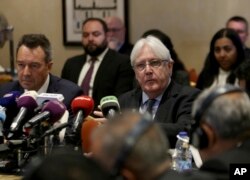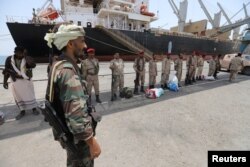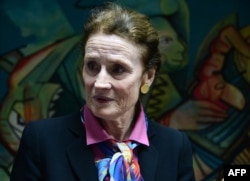The U.N. envoy for Yemen confirmed Wednesday that Houthi rebels have moved their military forces away from the critical Red Sea port of Hodeida, in a positive first step toward easing hostilities in the country's four-year-long civil war.
"The military forces of Ansar Allah have now left the three ports of al-Hodeida, Saleef and Ras Issa," Envoy Martin Griffiths told a meeting of the U.N. Security Council, using the official name of the Houthi movement.
The redeployment, which was agreed to at intra-Yemeni talks in Stockholm in December, had been repeatedly delayed, but the first phase was finally put in motion between Saturday and Tuesday.
Griffiths said the U.N. team monitoring the withdrawal said the Houthis were "fully compliant" and "very cooperative" during the process.
The pullback is significant, as Hodeida port has been a flashpoint in the conflict. Hodeida is the main point of entry for all commercial and aid supplies entering the country. Yemen imports 90% of all of its food.
Hodeida has been under Houthi control. Under the redeployment, the U.N. will now have full access to the ports, allowing its monitors to check ships docked there for any Houthi arms imports, which would be a violation of a U.N. arms embargo. They also hope it will make it easier to import food and other vital items.
Griffiths said the U.N. plans to improve productivity and efficiency of the port and will send teams in to upgrade berths and demine the outer perimeter of the port.
"This moment is significant, but this is only the beginning," Griffiths told the council. "These redeployments must be followed by concrete actions of the parties to deliver on their obligations under the Stockholm Agreement."
He said that would include implementing subsequent phases of the mutual redeployments in Hodeida and ensuring that the U.N. will be able to increase its role in the ports.
Over the past days, the Houthis unilaterally withdrew from the ports, but the government of Yemen will also pull back some of its forces to areas outside the city once Phase One is in full implementation mode, Lieutenant General Michael Lollesgaard, the head of the U.N. committee overseeing the withdrawal, told reporters in a video conference from Hodeida on Wednesday.
The United Nations plans to expand its monitoring and verification presence in Hodeida. Currently there are around 15 monitors, but Lollesgaard said 30 more are waiting on visa approvals from the Houthis, who are the de facto authorities in Hodeida.
The world body hopes that real progress in Hodeida could be the confidence-building measure needed to get the parties back to the negotiating table to discuss a political transition and ultimately, an end to the war.
Violence continued Thursday with airstrikes by the Saudi-led coalition in the Houthi-held Yemeni capital, Sanaa. Those strikes came two days after the Houthis claimed responsibility for drone attacks on oil facilities in Saudi Arabia.
There were also reports of clashes Wednesday in Hodeida, where a tenuous cease-fire is in place. Lollesgaard said he knew of the reports, but added, “it’s not an alarming number.”
Griffiths, however, cautioned violence has intensified in other parts of the country, including the south.
The humanitarian crisis in the country has also not eased significantly.
The U.N. says 14 million people are in acute need and another 10 million require some form of humanitarian assistance or protection. Yemen is the U.N.'s largest aid operation in the world and it has appealed for $4.2 billion to fund it this year. Only 20% of the money has been received, putting some programs in jeopardy.
Millions of those in need are children.
"Each day, another eight children will be killed, injured or recruited to the fighting," UNICEF Executive Director Henrietta Fore told the council. "Every 10 minutes another child will die of a preventable cause."
She appealed to the security council to protect Yemen's 15 million children.
"Please help them. They need peace."
A Saudi Arabian-led coalition began bombing Iranian-aligned Houthi rebels in support of Yemen's government in March 2015. Since then, the U.N. estimates more than 10,000 people have been killed, mostly due to coalition airstrikes.







